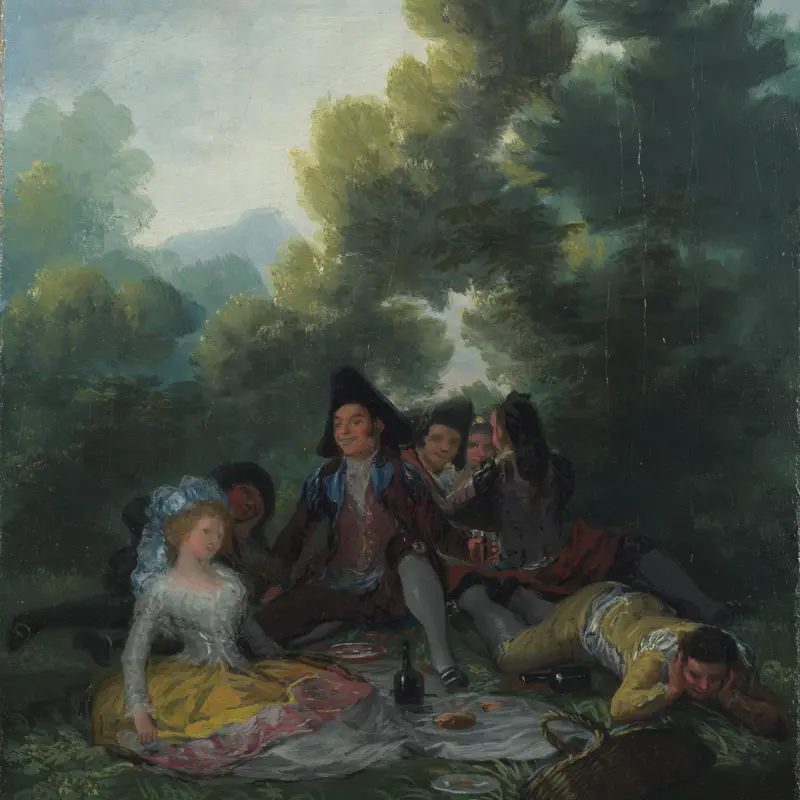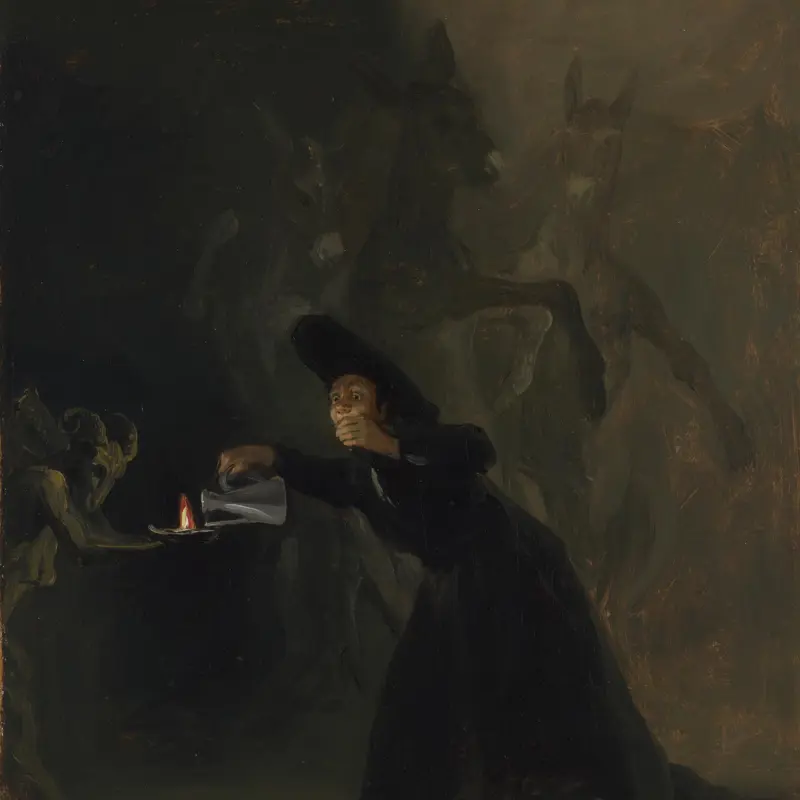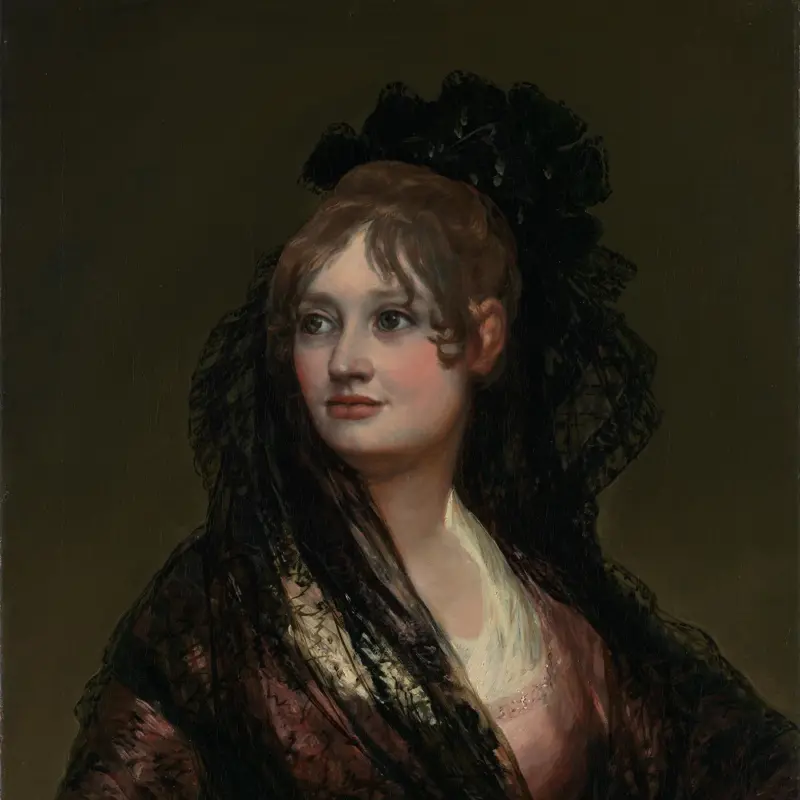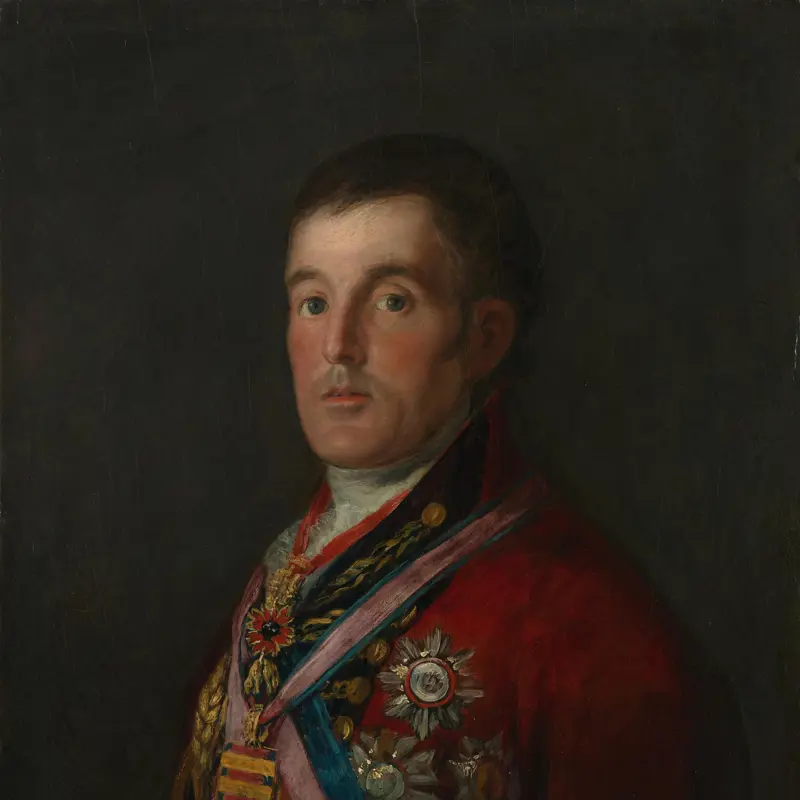Francisco de Goya, 'Don Andrés del Peral', before 1798
About the work
Overview
Andrés del Peral sits proudly on a simple chair and looks out at us with a penetrating stare. Goya shows Peral as he really was, with a receding hairline and grey hair. He looks as if he’s sneering at us, but his facial droop suggests he may have suffered a stroke. He places his left hand on his hip and the right is tucked into his waistcoat, a gesture commonly found in portraiture at this date.
A friend and contemporary of Goya’s, Peral was an accomplished gilder and worked for the royal court in Madrid from the late 1770s to the 1820s. Goya’s use of colour is subtle and delicate, his brushstrokes confident and at times even flamboyant. Our eye is drawn to the luxurious sheen of Peral’s silvery coat, and the striped waistcoat decorated with flowers beneath it.
Key facts
Details
- Full title
- Don Andrés del Peral
- Artist
- Francisco de Goya
- Artist dates
- 1746 - 1828
- Date made
- Before 1798
- Medium and support
- Oil on wood (poplar, identified)
- Dimensions
- 95 × 65.7 cm
- Acquisition credit
- Presented by Sir George Donaldson, 1904
- Inventory number
- NG1951
- Location
- Room 38
- Collection
- Main Collection
Provenance
Additional information
Text extracted from the ‘Provenance’ section of the catalogue entry in Neil MacLaren, revised by Allan Braham, ‘National Gallery Catalogues: The Spanish School’, London 1988; for further information, see the full catalogue entry.
Exhibition history
-
2013About FaceThe Barber Institute of Fine Arts17 May 2013 - 1 September 2013
-
2015Goya: The PortraitsThe National Gallery (London)7 October 2015 - 10 January 2016
Bibliography
-
1798El Zeloso del honor nacional', Diario de Madrid, 229, 1798, pp. 919-20
-
1901A.G. Temple, Descriptive and Biographical Catalogue of the Exhibition of the Works of Spanish Painters (exh. cat. Guildhall Art Gallery, 30 April - 31 July 1901), London 1901
-
1922A. de Beruete, Goya as Portrait Painter, London 1922
-
1947N. MacLaren et al., An Exhibition of Spanish Paintings (exh. cat. Arts Council of Great Britain, 11 February - 23 March 1947), London 1947
-
1955E. du G. Trapier, Goya: A Study of His Portraits, 1797-99, New York 1955
-
1963E. Helman, Trasmundo de Goya, Madrid 1963
-
1964E. du G. Trapier, Goya and His Sitters: A Study of His Style as a Portraitist, New York 1964
-
1964E. Helman, 'Identity and Style in Goya', The Burlington Magazine, CVI/730, 1964, pp. 30-7
-
1969N. Glendinning, 'Goya's Portrait of Andrés del Peral', Apollo, LXXXIX/85, 1969, pp. 200-3
-
1970J. Gudiol, Goya, 1746-1828: Biografia, estudio analitico y catalogo de sus pinturas, Barcelona 1970
-
1970N. MacLaren and A. Braham, The Spanish School, 2nd edn, London 1970
-
1971P. Gassier and J. Wilson-Bareau, Goya: His Life and Work, with a Catalogue Raisonné of the Paintings, Drawings and Engravings, London 1971
-
1981J. Camón Aznar, Francisco de Goya, Zaragoza 1981
-
1981A. Braham, El Greco to Goya: The Taste for Spanish Paintings in Britain and Ireland (exh. cat. The National Gallery, 16 September - 9 November 1981), London 1981
-
1983M. Helston, Spanish and Later Italian Paintings, London 1983
-
1983National Gallery, 'Pictures Cleaned and Restored in the Conservation Department of the National Gallery, January 1983 – December 1983', National Gallery Technical Bulletin, VIII, 1984, pp. 71-2
-
1987F.C. Serraller and I. García de la Rasilla (eds), Goya: Nuevas visiones: Homenaje a Enrique Lafuente Ferrari, Madrid 1987
-
1988Maclaren, Neil, revised by Allan Braham, National Gallery Catalogues: The Spanish School, 2nd edn (revised), London 1988
-
1992N. Glendinning and J. Wilson-Bareau, Goya: La década de los Caprichos, (exh. cat. Real Academia de Bellas Artes de San Fernando, 26 October 1992 - 10 January 1993), Madrid 1992
-
1994J. Tomlinson, Francisco Goya y Lucientes, London 1994
-
1996J.J. Luna et al., Goya: 250 aniversario (exh. cat. Museo Nacional del Prado, 3 March - 2 June 1996), Madrid 1996
-
2001
C. Baker and T. Henry, The National Gallery: Complete Illustrated Catalogue, London 2001
-
2003C. Higgitt, M. Spring and D. Saunders, 'Pigment-Medium Interactions in Oil Paint Films containing Red Lead or Lead-Tin Yellow', National Gallery Technical Bulletin, XXIV, 2003, pp. 75-95
-
2009D. Carr, El Greco to Goya: Spanish Painting, London 2009
About this record
If you know more about this work or have spotted an error, please contact us. Please note that exhibition histories are listed from 2009 onwards. Bibliographies may not be complete; more comprehensive information is available in the National Gallery Library.




